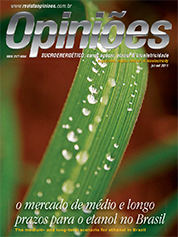Tarcilo Ricardo Rodrigues
Director of Bioagência de Fomento de Energia de Biomassa
Op-AA-29
The balance requires a pact
In the mid 70’s, when the expression energy security was not on the agenda of any government in the world, Brazil, under pressure from successive oil price shocks, undertook a daring pioneer initiative to counteract on the security issue, but mainly as concerning its energy independence. We were then a different country, and even more different than we might yet become.
We were winners in the past and we may be winners again in the future. The sugarcane-based ethanol industry came into existence, developed, and fulfilled its role in reducing the dependence in our country on imported oil, and nowadays stands out among all other countries for its huge capacity of adapting and quickly responding to the growth outlook.
Its attractiveness is acknowledged and made evident due to the presence among us of large international economic groups, here looking for an alternative energy transition to the fossil fuels of the 21st Century.
There is a paradox in the figures we all know. Since 2005, when this industry started to grow, at rates that were the reason for envy of the Chinese, the production capacity, both of sugar and ethanol, appeared to be insufficient to meet the demand of the domestic and international markets. The world has changed in this first decade of the new century.
Countries that until then played a secondary role in the international scenario now arise as economic powerhouses. Income is being better distributed, causing significant increase in the demand for food and energy, both of which are now viewed by governments and companies in a strategic manner.
We are the largest and most important supplier country of sugar in the international market and we may again occupy this same position with respect to biofuels. The oil supply and demand balances and the demand for sustainable alternatives bring about a favorable environment for the consumption on a grand scale throughout the world, and not only in Brazil.
The barriers erected against the free trade of ethanol, previously justified to protect local companies in consumer countries, are gradually being eliminated, whether due to the increase in production costs, direct competition with food, or the need for far-reaching economic reforms in those countries.
Ethanol from sugarcane is becoming the most competitive and effective product capable of replacing fossil fuel and as an important factor for the reduction of greenhouse gases, classifying itself in the low carbon category that certainly will be the driving force of sustainable development in this century. The recognition by the Environmental Protection Agency (EPA) of the United States, of ethanol from sugarcane as an advanced biofuel, emphasizes this trend.
The imminent elimination of subsidies on ethanol from corn and the tariff barriers on ethanol imported by the United States open an unprecedented opportunity for the ethanol industry’s growth. The sugarcane-based energy industry must still meet the demand of the domestic market for fuel, which is expanding at an accelerated pace, above the country’s growth rate.
The strong presence of the State in this market places two distinct models in competition, which require minimal and clear regulatory marks to warrant the fuel supply for the national fleet and in order to not run the risk of witnessing a country with the potential to become the world’s largest fuel supplier become one of the largest importers of such product.
Gasoline and ethanol have separate production, sales and management systems. Recently, the ANP (National Oil Agency) was entrusted with warranting the co-existence of the state and private models within the market rules. This model, if well defined, may result in sound and positive competition for raw material between sugar and ethanol in coming years, because these markets have distinct features, which will probably be out of synchronization between themselves.
In the current model, whenever it is necessary to adjust ethanol prices to restrain or accelerate demand, gasoline will absorb such fluctuations in volume, resulting in adjustments to the production in the Petrobras refineries in a short period. Without a clear policy defining the share each type of fuel will have in the future, and with growing demand, such fluctuations may have severe consequences for the supply of fuel, with incalculable burdens on both sectors.
The regulatory body is responsible for developing a policy for the co-existence of gasoline and ethanol, while exploiting the potentialities of both products. In a country of continental size, such differences must serve as vectors for such a policy, for the sake of benefitting the social and economic development of each region.
Sugarcane has technical limits gasoline does not have. To take advantage of this fact may become a competitive edge no other country in the world has. Brazil developed an energy matrix in which biofuels compete and are not only additives for fossil fuels, resulting in extremely advantageous conditions for both. This equilibrium requires a pact with society in the same deterministic intensity that once placed us at the forefront of renewable fuels.




